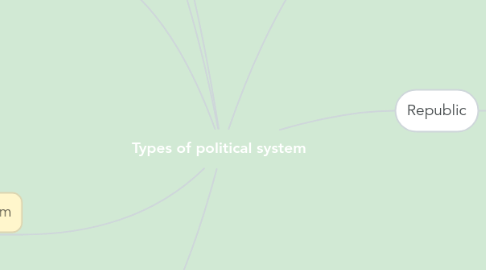
1. Communism
1.1. Business Ownerships
1.1.1. Most business are owned by the Gov
1.2. an equitable distribution of wealth and resources , common ownership of business and property and state control of all economic and social activities.
1.3. strict limitations on business stifle productivity and inovation.
1.4. focuses on developing a knowledge , heroic working class devoted to social cohesion. worked responsibility and rewards are shared equally.
2. Monarchy
2.1. most of the rulling power in hands of a single individual.
2.2. Monarchies such as those in medieval Europe operated on the principle of the divine right, which posits that kings and queens derive their right to rule from a delty.
2.3. 2 types
2.3.1. absolute monarchy, and constitutional monarchy.
3. Dictatorships
3.1. a country , Gov or the form of Gov in which absolute power is excersed by dictator.
3.2. types of dictator
3.2.1. politicans regulate nearly every aspect of the public and private behaviour of citizens.
3.3. totalitariannism
3.3.1. generally employ political propaganda to decrease the influence of proponents of alternative governing systems.
4. Theocracy
4.1. is a form of government in which deity is source from which all authority derives.
5. Anarchy
5.1. Society without a publicly enforced government or violently enforced political authority.
6. Democracy
6.1. Rule by the omnipotent majority. No protection by minority groups.
6.2. Constraints on the Government.
6.2.1. No. the majority can impose its will on the minority
6.3. Free choice
6.3.1. Individuals may make decisions for except insofar as a majority faction has limited individuals
6.4. Economic System
6.4.1. Elected by the voters or their elected representatives.
6.5. Variations
6.5.1. direct democracy, parliamentary democracy, representative democracy, presidential democracy
6.6. example
6.6.1. U.S , Canada, Australia, Malaysia
7. Republic
7.1. same goes to representative democracy except it has a written constitution of basic rights that protect the minority from being completely unrepresented or overridden by the majority
7.2. Constraint on the Gov
7.2.1. Yes. the majority cannot take away certain inalienable rights.
7.3. Free Choice
7.3.1. individuals may make decisions for themselves, especially insofar as there is a constitutional prohibition on interfering with freedom of choice.
7.4. vairations
7.4.1. democratic republics, Constitutional republics.

